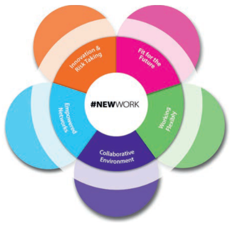As the upheaval of the Fourth Industrial Revolution is felt across the globe, businesses and organizations are struggling to keep up with the pace of change.
The United Nations is no exception. In the 2017 UN Staff Engagement Survey, more than half of respondents either doubted or disagreed that their group, or the UN Secretariat as a whole, adapts well to change, and fewer than half believed we are open to new ideas at the UN Secretariat.
While the 2017 survey showed the UN has a highly engaged workforce, staff are well aligned with organizational goals, and there is strong collaboration between co-workers, it also identified other aspects of workplace culture that need to be addressed to ensure our continued effectiveness. These included greater cooperation across different departments and groups, better performance management and accountability, improved leadership communication, and greater trust in and empowerment of staff. Some of the same concerns were echoed in the Young UN Temperature Checks on UN Reform (February and May 2019), where culture change was cited as a critical need to ensure the success of reforms.
In our current global context where an effective UN is more crucial than ever, where anticipating and adapting to future ways of working is critical to success, and where numerous internal changes are also under way, there is a pressing need to develop a more future-ready workplace culture.
#NewWork: staff driving culture change
A desire to take a proactive approach to change sparked the #NewWork culture-change initiative – initially at UN Geneva and now expanding to the Secretariat globally, says Daniela Wuerz, a #NewWork champion and local coordinator in Geneva.
#NewWork includes a vision for the kind of workplace culture we want at the UN and a strategy for how we will nurture and drive the change we want to see. The vision draws on staff feedback from surveys, reports and engagement sessions, and as more and more colleagues get involved, we’re refining that vision and further developing the strategy and action plan,” she says.
The #NewWork vision is explained through five themes (see graphic). For each, a series of goals and activities has been developed.
Innovation and Risk-taking: a culture where innovation becomes mainstream and we are all empowered to seek new and better ways to solve problems and achieve our objectives; a place where managers and staff are comfortable taking measured risks and dare to fail. Actions have included several innovation-focused events, e.g. the “Dragon’s Den’ and 100-Day Innovation Challenges, along with trainings to equip staff and managers to take measured risks to foster innovation.
Collaborative Environment: a culture with widespread intra- and cross-departmental collaboration, learning and sharing of experiences, and effective communication within and between teams. Steps towards achieving this have included the formalization of a cross-assignments scheme, the introduction of collaborative meeting techniques (e.g. “Huddles’) and the rollout of digital collaboration tools such as MS Teams and Sharepoint.
Empowered Networks: a workplace where teams, reportinglines and decision-making are organized around projects rather than organizational hierarchy, and where teams are empowered to self-manage. In 2020, there will be trainings developed for staff on working in matrix structures, and trainings for managers on mentorship and coaching. There will also be opportunities for managers to pledge their support for less hierarchical ways of working.
Fit for the Future: a culture where continuous growth is valued and all staff have opportunities to develop the necessary skills and knowledge to be effective in a rapidly-changing environment. To contribute towards this goal, trainings and briefings have been provided to staff on topics such as digital literacy, emerging technologies (e.g. AI, blockchain, virtual reality, etc.), design thinking and other innovation–related subjects.
Working Flexibly: a culture where there is broad acceptance of flexible working practices, where management of staff is based on outcomes (not physical presence) and where appropriate technologies have been adopted to support these new ways of working. To support this goal, the Secretariat’s improved policy on Flexible Working Arrangements has been promoted under #NewWork, which has included training more than 220 staff and 120 managers in Geneva so far on how to effectively work remotely, or manage people who are doing so.
#NewWork in 2020
A new year brings new opportunities. For each of the five themes, the existing activities will be continued and new ones added. The #NewWork team will also be working to build the #New- Work network – staff who take a positive approach to change and are enthusiastic about guiding others through the journey to the “UN we want”. People will be able to get involved by joining an online community, proposing or supporting #NewWork activities or projects, or by aligning existing ones with #NewWork. This year will also see the launch of #NewWork globally, with staff at the UNHQ involved. Liliana Uruburo, a #NewWork champion in New York, says there are many colleagues keen to get behind creating a more fulfilling and productive workplace: “We’re proud to work for the UN, we care about its mission and the people it serves. We want to be successful at what we do. #NewWork offers a great creative outlet for people who have good ideas about how to improve the UN.”
Colleagues wanting to find out more about #NewWork or how to get involved can visit https://iseek.un.org/newwork
1 Deloitte, 2017, Rewriting the rules for the digital age: 2017 Deloitte Global Human Capital Trends https://www2.deloitte.com/content/dam/Deloitte/ global/Documents/About-Deloitte/central-europe/ce-global-human-capital- trends.pdf 2 February 2018, United Nations Staff Engagement Survey, UN Secretariat Survey Results



